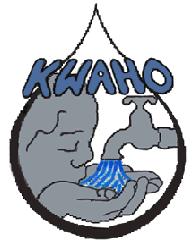Difference between revisions of "Kenya Water for Health Organisation (KWAHO)"
| Line 6: | Line 6: | ||
class = National NGO | | class = National NGO | | ||
keywork = empowerement, <br /> capacity building, <br />monitoring & evaluation | | keywork = empowerement, <br /> capacity building, <br />monitoring & evaluation | | ||
| − | website = [ | + | website = [http://www.kwaho.org/ kwaho.org] |
}} | }} | ||
Revision as of 05:07, 27 May 2015
| Kenya Water for Health Organisation | |

| |
| Location: | Nairobi, Kenya |
| Type: | NGO |
| Class: | National NGO |
| Key work: | empowerement, capacity building, monitoring & evaluation |
| Website: kwaho.org | |
Kenya Water for Health Organisation (KWAHO) is a national non-governmental organisation providing sustainable water and sanitation for the disadvantaged communities in Kenya. Its existence dates back to 1976 when it was launched as a UNICEF/NGO Water for Health Project by the National Council of Women of Kenya (N. C. W. K.). Part from the physical implementation of water and sanitation projects, KWAHO economically empowers the target groups (mainly women) through income generating activities. These are promoted within the context of gender development. The KWAHO support consists of the encouragement of traditional women group activities and the conferment of skills required for these activities to develop in the most sustainable manner. KWAHO advocates the crucial role women play in water supply. Since women are traditionally responsible for collecting water and therefore have got a special interest in a well-sustained scheme, KWAHO promotes the participation of women. The most important impact of KWAHO Projects is the enhancement of awareness of the necessity for safe and clean drinking water and improved sanitation and hygiene appliances and practices in.
Main activities
- Water and sanitation capacity building.
- Hygiene education & promotion
- Training and sensitization to achieve ownership.
- Monitoring and evaluation.
- Women empowerement in community projects.
- Impact analyses on environment.
- Sensitivity analyses of socio-cultural factors.
- Collaboration with stakeholders to ensure implementation of projects
- Collaboration with stakeholders to ensure continuity of projects.
